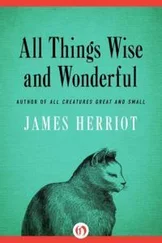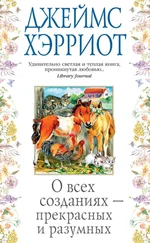Джеймс Хэрриот - All Creatures Great and Small
Здесь есть возможность читать онлайн «Джеймс Хэрриот - All Creatures Great and Small» весь текст электронной книги совершенно бесплатно (целиком полную версию без сокращений). В некоторых случаях можно слушать аудио, скачать через торрент в формате fb2 и присутствует краткое содержание. Год выпуска: 2011, ISBN: 2011, Издательство: Open Road Media, Жанр: Домашние животные, на английском языке. Описание произведения, (предисловие) а так же отзывы посетителей доступны на портале библиотеки ЛибКат.
- Название:All Creatures Great and Small
- Автор:
- Издательство:Open Road Media
- Жанр:
- Год:2011
- ISBN:9781453234488
- Рейтинг книги:4.33 / 5. Голосов: 3
-
Избранное:Добавить в избранное
- Отзывы:
-
Ваша оценка:
- 80
- 1
- 2
- 3
- 4
- 5
All Creatures Great and Small: краткое содержание, описание и аннотация
Предлагаем к чтению аннотацию, описание, краткое содержание или предисловие (зависит от того, что написал сам автор книги «All Creatures Great and Small»). Если вы не нашли необходимую информацию о книге — напишите в комментариях, мы постараемся отыскать её.
All Creatures Great and Small — читать онлайн бесплатно полную книгу (весь текст) целиком
Ниже представлен текст книги, разбитый по страницам. Система сохранения места последней прочитанной страницы, позволяет с удобством читать онлайн бесплатно книгу «All Creatures Great and Small», без необходимости каждый раз заново искать на чём Вы остановились. Поставьте закладку, и сможете в любой момент перейти на страницу, на которой закончили чтение.
Интервал:
Закладка:
“It’s an interesting point,” I said. “And I think you’ve put your finger on it with the numbers. You know there are a lot of our farmers up in the high country who have only a few stock. They always have names for their cows—Daisy, Mabel, I even came across one called Kipperlugs the other day. I do think these small farmers have an affection for their animals but I don’t see how the big men can possibly have.”
Siegfried rose from the table and stretched luxuriously. “You’re probably right. Anyway, I’m sending you to see a really big man this morning. John Skipton of Dennaby Close—he’s got some tooth rasping to do. Couple of old horses losing condition. You’d better take all the instruments, it might be anything.”
I went through to the little room down the passage and surveyed the tooth instruments. I always felt at my most mediaeval when I was caught up in large animal dentistry and in the days of the draught horse it was a regular task. One of the commonest jobs was knocking the wolf teeth out of young horses. I have no idea how it got its name but you found the little wolf tooth just in front of the molars and if a young horse was doing badly it always got the blame.
It was no good the vets protesting that such a minute, vestigial object couldn’t possibly have any effect on the horse’s health and that the trouble was probably due to worms. The farmers were adamant; the tooth had to be removed.
We did this by having the horse backed into a corner, placing the forked end of a metal rod against the tooth and giving a sharp tap with an absurdly large wooden mallet. Since the tooth had no proper root the operation was not particularly painful, but the horse still didn’t like it. We usually had a couple of fore-feet waving around our ears at each tap.
And the annoying part was that after we had done the job and pointed out to the farmer that we had only performed this bit of black magic to humour him, the horse would take an immediate turn for the better and thrive consistently from then on. Farmers are normally reticent about our successful efforts for fear we might put a bit more on the bill but in these cases they cast aside all caution. They would shout at us across the market place: “Hey, remember that ’oss you knocked wolf teeth out of? Well he never looked back. It capped him.”
I looked again with distaste at the tooth instruments; the vicious forceps with two-feet-long arms, sharp-jawed shears, mouth gags, hammers and chisels, files and rasps; it was rather like a quiet corner in the Spanish Inquisition. We kept a long wooden box with a handle for carrying the things and I staggered out to the car with a fair selection,
Dennaby Close was not just a substantial farm, it was a monument to a man’s endurance and skill. The fine old house, the extensive buildings, the great sweep of lush grass land along the lower slopes of the fell were all proof that old John Skipton had achieved the impossible; he had started as an uneducated farm labourer and he was now a wealthy landowner.
The miracle hadn’t happened easily; old John had a lifetime of grinding toil behind him that would have killed most men, a lifetime with no room for a wife or family or creature comforts, but there was more to it than that; there was a brilliant acumen in agricultural matters that had made the old man a legend in the district. “When all t’world goes one road, I go t’other” was one of his quoted sayings and it is true that the Skipton farms had made money in the hard times when others were going bankrupt. Dennaby was only one of John’s farms; he had two large arable places of about four hundred acres each lower down the Dale.
He had conquered, but to some people it seemed that he had himself been conquered in the process. He had battled against the odds for so many years and driven himself so fiercely that he couldn’t stop. He could be enjoying all kinds of luxuries now but he just hadn’t the time; they said that the poorest of his workers lived in better style than he did.
I paused as I got out of the car and stood gazing at the house as though I had never seen it before; and I marvelled again at the elegance which had withstood over three hundred years of the harsh climate. People came a long way to see Dennaby Close and take photographs of the graceful manor with its tall, leaded windows, the massive chimneys towering over the old moss-grown tiles; or to wander through the neglected garden and climb up the sweep of steps to the entrance with its wide stone arch over the great studded door.
There should have been a beautiful woman in one of those pointed hats peeping out from that mullioned casement or a cavalier in ruffles and hose pacing beneath the high wall with its pointed copings. But there was just old John stumping impatiently towards me, his tattered, buttonless coat secured only by a length of binder twine round his middle.
“Come in a minute, young man,” he cried. “I’ve got a little bill to pay you.” He led the way round to the back of the house and I followed, pondering on the odd fact that it was always a “little bill” in Yorkshire. We went in through a flagged kitchen to a room which was graceful and spacious but furnished only with a table, a few wooden chairs and a collapsed sofa.
The old man bustled over to the mantelpiece and fished out a bundle of papers from behind the clock. He leafed through them, threw an envelope on to the table then produced a cheque book and slapped it down in front of me. I did the usual—took out the bill, made out the amount on the cheque and pushed it over for him to sign. He wrote with a careful concentration, the small-featured, weathered face bent low, the peak of the old cloth cap almost touching the pen. His trousers had ridden up his legs as he sat down showing the skinny calves and bare ankles. There were no socks underneath the heavy boots.
When I had pocketed the cheque, John jumped to his feet. “We’ll have to walk down to t’river; ’osses are down there.” He left the house almost at a trot.
I eased my box of instruments from the car boot. It was a funny thing but whenever I had heavy equipment to lug about, my patients were always a long way away. This box seemed to be filled with lead and it wasn’t going to get any lighter on the journey down through the walled pastures.
The old man seized a pitch fork, stabbed it into a bale of hay and hoisted it effortlessly over his shoulder. He set off again at the same brisk pace. We made our way down from one gateway to another, often walking diagonally across the fields. John didn’t reduce speed and I stumbled after him, puffing a little and trying to put away the thought that he was at least fifty years older than me.
About half way down we came across a group of men at the age-old task of “walling”—repairing a gap in one of the dry stone walls which trace their patterns everywhere on the green slopes of the Dales. One of the men looked up. “Nice mornin’, Mr. Skipton,” he sang out cheerfully.
“Bugger t’mornin’. Get on wi’ some work,” grunted old John in reply and the man smiled contentedly as though he had received a compliment.
I was glad when we reached the flat land at the bottom. My arms seemed to have been stretched by several inches and I could feel a trickle of sweat on my brow. Old John appeared unaffected; he flicked the fork from his shoulder and the bale thudded on to the grass.
The two horses turned towards us at the sound. They were standing fetlock deep in the pebbly shallows just beyond a little beach which merged into the green carpet of turf; nose to tail, they had been rubbing their chins gently along each other’s backs, unconscious of our approach. A high cliff overhanging the far bank made a perfect wind break while on either side of us clumps of oak and beech blazed in the autumn sunshine.
Читать дальшеИнтервал:
Закладка:
Похожие книги на «All Creatures Great and Small»
Представляем Вашему вниманию похожие книги на «All Creatures Great and Small» списком для выбора. Мы отобрали схожую по названию и смыслу литературу в надежде предоставить читателям больше вариантов отыскать новые, интересные, ещё непрочитанные произведения.
Обсуждение, отзывы о книге «All Creatures Great and Small» и просто собственные мнения читателей. Оставьте ваши комментарии, напишите, что Вы думаете о произведении, его смысле или главных героях. Укажите что конкретно понравилось, а что нет, и почему Вы так считаете.
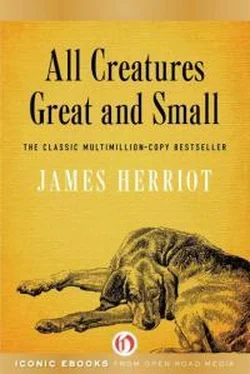
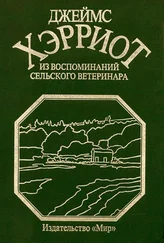
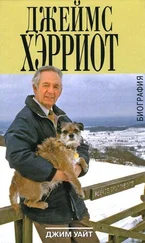
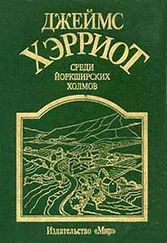
![Джеймс Хэрриот - О всех созданиях – больших и малых [litres]](/books/391169/dzhejms-herriot-o-vseh-sozdaniyah-bolshih-i-malyh-thumb.webp)

